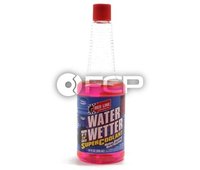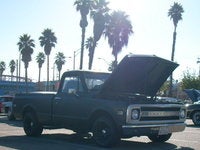My 1973 pickup is overheating at freeway speeds. I have checked the thermostat and it works correctly, it does not have any leaks that I have found. I need help figuring it out. Please help.
9 Answers
straight water will cool better..sorry...add a can of ( water wetter) check the lower hose ALSO to make sure it isnt collapsing.. advance the timing at 3000rpm till it just starts to miss
Kelly, If you were to do a Google search for water vs. antifreeze, winter or summer, you will find no support for running water for anything other than pressure tests. Absolutely do not use regular water for an extended period. It will cause more problems. Antifreeze helps keep corrosion away and does aid in cooling in warm weather, better than straight water. Water is corrosive. You will shorten your engine's life if you don't add antifreeze. Antifreeze, on top of everything else it does, also acts as a rust inhibitor. Yes, you can run straight water, but your coolant boiling point will be lower AND you'll corrode the inside of your engine and destroy your water pump.
come on man....you guys all missed that i said add a bottle of (water wetter)..its superior protection !For vehicles that want to run an all water coolant setup..For vehicles that need to run an all water coolant setup ... ps..i dont work for them...i just use it in my high dollar engines.... WaterWetter is a unique wetting agent for cooling systems which reduces coolant temperatures by as much as 30 degrees F. This liquid product can be used to provide rust and corrosion protection in plain water for racing engines, which provides much better heat transfer properties than glycol-based antifreeze. Or it can be added to new or used antifreeze to improve the heat transfer of ethylene and propylene glycol systems. Designed for modern aluminum, cast iron, copper, brass and bronze systems. Compatible with all antifreezes, including the latest long-life variations. Features and benefits: Doubles the wetting ability of water Improves heat transfer Reduces cylinder head temperatures May allow more spark advance for increased torque Reduces rust, corrosion and electrolysis of all metals Provides long term corrosion protection Cleans and lubricates water pump seals Prevents foaming Reduces cavitation corrosion Complexes with hard water to reduce scale
Kelly, you are so correct. I applaud you. Water wetter is used in racing engines because a lot of racing associations will not permit antifreeze in the cooling systems incase engine cooling fluid is dumped on the track and it creates a mess to clean up, and the track unsafe and slick. Water wetter does the same as antifreeze as far as lowering the cooling temperature of the engines by pulling the heat away from the hot surfaces. It also provides antioxidant properties to curb rust or oxidation from starting in the internal expensive engine parts. What you have said water wetter does, is or can be said or copied as what antifreeze does to engines. Not to mention it lowers the temperature the coolant will freeze when it gets below zero. So if you use it in your expensive racing engines, you are doing good so others will not spin out and wreck and risk injury IF you happen to spill coolant or wreck your racing machine. For all us other non-racing peons, antifreeze gives what protection the car manufacture recommends. So you can do what you want, but I’ll go with the multi billion-car manufactures recommend for their designed engines. Good luck with your racing season.
califcarson ...hi again...also we are talking about a 1973 engine here that is over heating. you know what i would do next is ask (1973Truck) what engine ?carb he has.stock factory/stock replacement/aftermarket/other ? id pull a vac hose of at 3000rpm and see what the engine does, wants or doesnt want...i wouldnt be surprised if its lean. i added the factory carb list becaus i found that the main system jetting and transaction is mor than + or - 10.7043009 1973 1 250 ALL GM TRUCK H/CH 7043021 1973 1 250 M GM TRUCK 10/20/30-A/CH 7043022 1973 1 250 A GM TRUCK 10/20/30-A/CH 7043025 1973 1 250 ALL GM TRUCK 20/30 H/D 7043026 1973 1 292 ALL GM TRUCK 20 & 30 SERIES WITH A/CH 7043103 1973 2 307 ALL GM TRUCK G10 7043105 1973 2 307 ALL GM TRUCK C/K 10 SERIES 7043108 1973 2 307 A GM TRUCK 20 & 30 SERIES 7043200 1973 4 454 A GM TRUCK LIGHT DUTY 7043201 1973 4 454 M GM TRUCK LIGHT DUTY 7043202 1973 4 350 A GM TRUCK K10/K20 7043207 1973 4 454 ALL GM TRUCK C20/C30/P30 7043208 1973 4 350 ALL GM TRUCK C/P/K 20 & 30 SERIES 7043210 1973 4 350 A GM TRUCK G10 7043211 1973 4 350 M GM TRUCK G10 7043215 1973 4 350 ALL GM TRUCK G/P-30 i guessing all the basics were checked.. id like to know if its running lean...
Ok Kelly, am I to be impressed because you know or can write a lot of codes almost no one knows or cares about? The guy has a 1973 old Chevy P/U truck that overheats at freeway speed. First is to make sure there is fluid in the system to cool it. Next is to make sure the water pump and hoses are functioning properly. We then go to the radiator. Is it clean and open to air flow and is it old and clogged or just old and functioning? Timing can make an engine run hot if the timing is off. The best way to analyze a problem is to start with the normal causes, usually the simple ones, also the most common, keeping in mind lower cost fixes. Move up to mechanical failures of what normally occurs, keeping in mind, this is a 42 year old vehicle with no modern day tech. on it. Yes, it is correct to ask if newer parts have been replaced, like the engine and carburetors, radiators, fans, belts, hoses, fluid, thermostats, bugs in the radiator, and the list goes on. Worn out rod bearings also can be creating a drag on the engine and cause excessive heat also, but there could be more symptoms other than overheating at high engine running RPMs. It is non productive to just throw manual numbers out at people who have no idea what they mean. This posting is to help people that are having questions on the why and how to logically locate th causes of their problems with the vehicles they own or drive. I have been successful in assisting with many asking questions asked by vehicle owners, and I also have inquired of other people's knowledge and assistance and have received good solid and correct answers. I also have been very successful in rooting out answers by going on line and getting a good education on not only the whys, but the how it works and why it fails. So I hate to be a bump in your road, but I'm not that impressed with your last answer. It was not directed to "1973truck" or his question.
yep.. just trying to give you something to find wrong again and keep you busy. yes it can be anything..so if its not one of these>...add a can of ( water wetter) check the lower hose ALSO to make sure it isnt collapsing.. advance the timing at 3000 rpm till it just starts to miss..or its running lean.. if you want to then tell me its a vacuum hose connected to the power booster and the power booster is leaking its up to you.. i just hope he posts the problem if /when it gets fixed...this is basic stuff here..
Check the timing. Check to see if the water pump is working correctly and the belts are tight to turn it at high revolutions. Is there a possible blockage in the radiator? Old hoses when hot will collapse, preventing flow if liquid. Check the radiator cap. If it is bad, you may not have a pressurized cooling system and the liquid flow is impaired. Have you replace the head gaskets lately? Some gaskets are universal gaskets and have to have holes punched out of the gaskets on some heads/motors to open the water jackets. I had an acquaintance ruin a newly rebuilt engine because of that same thing. Are all the butterflies and crows cleaned out of the front of the radiator? Do you have electric fans? Are they working? Normally fans are not necessary at freeway speeds due to the amount of air flow, but they also have a restriction on air passing through and need to run at times to keep the fluid cool. If you have a clutch fan, is it working? Straight water will not cool as good as part water and part antifreeze. Also are you judging the over heating because of the gage? Your sensor could be bad. This is a very common part that needs to be replaced from time to time. If you have a garage or someone with a heat sensing gun, have them shoot the engine when you think it is over heating and find the very hot spots. Go from there. Also how many miles are on the engine? You may be looking at one that may need a lot of attention/rebuild.

